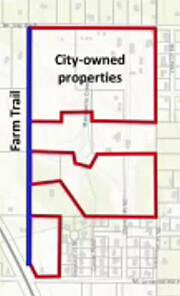One of the city of Bainbridge Island’s own advisory committees was looking for support from the City Council Nov. 8 regarding a potential playground at Fort Ward.
The Historic Preservation Society asked the council to join it in opposing the playground because it is at a historic site.
At first, councilmembers seemed to agree.
“Very few places are saved” for historical purposes on BI, Councilmember Clarence Moriwaki said. “It was a top-secret listening post” during World War II. He added that the commission is charged with preserving historical places on BI. “They are not against kids, family or playgrounds,” he said.
Councilmember Michael Pollock agreed. “We’ve lost so much history on that site already,” he said, adding Bainbridge Island Metro Parks & Recreation District should choose a different location.
Councilmember Jon Quitslund said there is serious opposition to a playground at Fort Ward, and that they “have not been heard fairly by the parks district. They need some support.” He added that while the parks district and the city have been improving their relationship in working together, “Their separateness has not always been advantageous to the community as a whole.”
Councilmember Kirsten Hytopoulos changed the tide by saying that she has a problem “interjecting our voice” when parks is the one that gets to decide if there is a problem with the project. She also said that the Historic Preservation Society can participate in the parks process to voice its concerns.
Councilmembers Leslie Schneider and Brenda Fantroy-Johnson agreed that proper procedure wasn’t being followed. Mayor Joe Deets also agreed.
City manager Blair King added that since the property is owned by the parks district, the council’s authority is minimal.
Meanwhile, city Public Works director Chris Wierzibicki gave an update on the Farm Trail. He said together the city and parks district are 80% done with a projected finish date in March 2023.
Right now its surface is wood chips. To improve the surface for biking, that would take about $250,000 for gravel or $770,000 for pavement. While wood chips are allowed through wetlands, if one of the other two surfaces are put in a boardwalk it would be required for part of the trail, plus stormwater management plans would be more extensive.
Hytopoulos said they could talk about a different surface in the future, but asphalt is not within the budget right now.
“We don’t need to pave every trail,” Fantroy-Johnson said, adding that money could be spent on other priorities.
Moriwaki agreed. “We’re not a cash cow,” he said. “Others have been waiting in line for a long time” for funding.
Schneider wanted to pave it. “If we do it at all we need to pave it,” she said. “We’ve got a nice trail, but it’s not meeting our goals” in the Sustainable Transportation Plan.
No action was taken.
During public comments, a number of people spoke in favor of preserving buildings at the historic Suyematsu Public Farmland.
John Garfunkle, speaking for the Suyematsu family, read a letter that says the farmhouse has been condemned. “We were shocked to hear this,” he read, especially considering the significance of the house in the Japanese-American history on BI. He read that they are appalled by the neglect in the upkeep and asked that repairs be done immediately to prevent further damage.
Kate Curtis added that any future redevelopment does not align with the heritage of the property, which is a cultural classroom for education and a “unique community asset.” She said the collection of farmers who work the 40 acres trying to carry on the legacy have not been consulted about possible changes. Curtis called the sale of the farmland to the city a gift given with the faith that it would remain as such. And development would break that trust.
King said the long-term lease with Friends of the Farm will be looked at next year, and the Suyetmatsu Public Farmland could possibly be removed from the lease.
Also, the council discussed its legislative policies as state lawmakers will start meeting again in January. Priorities include funding for public safety, transporation and water systems. Reducing greenhouse gas emissions and improving energy efficiency also rate high.
“We want local control,” King said, adding that working with the Association of Washington Cities adds to their clout. BI also wants to watch bills on affordable housing, because a few returning from last year “are not consistent with our voting.”
Deets said another bill that could come back that the city should oppose would allow the state to require housing near transit. “That would blow away what we’re trying to do at the local level.”
Planning director Patricia Charnas added: “We want flexibility. Some (state) mandates don’t think of everything.”
The council also:
•Passed the budgets for 2023-24. The main difference from previous versions was to hire a full-time leader for the Sustainable Transporation Plan starting in July 2023.
•Agreed to redistricting the North, South and Central wards on BI to balance their populations. Each ward has two representatives on the council, plus there is one at-large position.
•Agreed to discuss in the future a possible moratorium on inns. The Planning Commission has said a “loophole” in the law has allowed an inn of 45 rooms to be developed in the Lynwood Center area. Hytopoulos said the code is not being applied as intended to keep inns small.
•Passed proclamations for Transgender Awareness Week, Small Business Saturday and Veterans Day.
In public comments:
Deannna Martinez said the Bainbridge Conservation Coalition has been putting out misinformation about women of color in leadership. She said while she knows there is Freedom of Speech, there also are consequences for them. She said there is too much silence about the ongoing harm being caused.
Chuck Span asked for the city’s help to clean up a property where people are living in outbuildings and urinating and defacating in the land around them.



